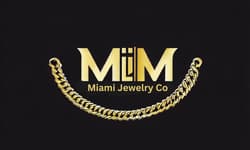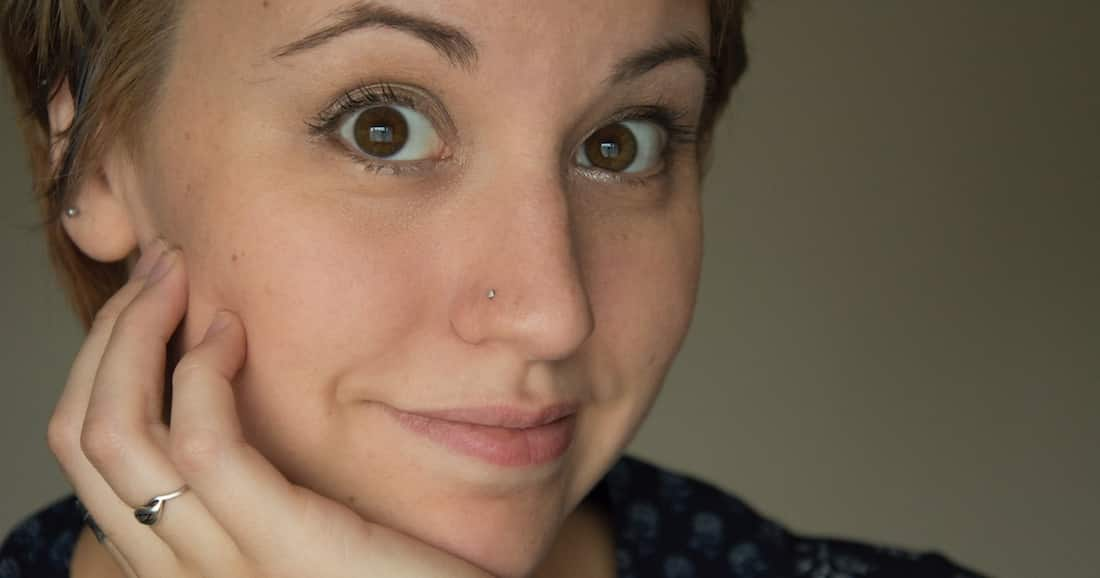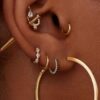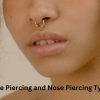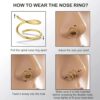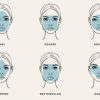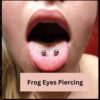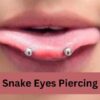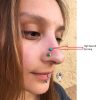Nose Piercing
Foods To Avoid After Nose Piercing 2024
Welcome! As an experienced specialist in the world of piercings, I’m here to navigate you through the often-overlooked aspect of nose piercing aftercare – your diet.
With years of experience in the field, I’ve seen how diet can play a crucial role in the recovery process. You may be surprised, but what you eat can either help speed up healing or cause unnecessary discomfort.
So, let’s delve into the foods you might want to steer clear of after getting that stylish nose piercing. Together, we’ll ensure your piercing heals beautifully and without a hitch. Ready? Let’s dive in!
Contents
Key Takeaways
- Your diet significantly impacts the healing of a nose piercing.
- Avoid high-sodium, processed, sugary, and hard foods, along with alcohol and caffeine.
- Include nutritionally balanced and hydrating foods to support healing.
- Maintain good hygiene and hydration, get adequate sleep, and exercise cautiously.
- Consult a professional if you notice signs of infection.
Understanding Nose Piercing Healing
Process of Healing
A nose piercing, like any other body modification, goes through a comprehensive healing process. This involves the initial inflammatory stage, the proliferation stage where new skin cells are formed, and the maturation stage where the piercing strengthens and stabilizes.
Factors Affecting Healing
Multiple factors can impact this healing process, including hygiene, the material of your jewelry, and importantly, your diet.
Importance of Diet in the Healing Process

Your dietary choices can significantly affect your body’s healing capacity. Not only can they either promote or deter the healing process, but they can also impact your comfort level during this period. Let’s explore the role of diet in the healing process further.
Role of Vitamins and Minerals
Your body needs adequate vitamins and minerals for optimal healing. Nutrients like vitamin C and zinc are crucial for tissue repair and immune function.
Impact of Hydration
Staying hydrated is also essential. It helps flush out toxins and supports overall bodily functions.
Foods To Avoid After Nose Piercing
Now that we understand how crucial diet is in the healing process, let’s dive into the foods you should avoid after getting your nose pierced.
Spicy Foods
Spicy foods may increase blood flow and potentially lead to swelling and discomfort around your fresh piercing. The capsaicin present in spicy foods has been shown to increase circulation, which may cause your piercing to become more sensitive and possibly even swell or bleed. It’s a good idea to limit foods like hot peppers, curries, and dishes with heavy spices, especially during the initial healing phase.
Salty Foods
Highly salty foods can cause your body to retain water, leading to swelling. It could be problematic if this swelling occurs around your piercing. In addition, consuming too much salt can lead to dehydration, which can slow down the healing process. Try to limit your intake of foods like chips, canned soups, processed meats, and fast foods.
Sugary Foods
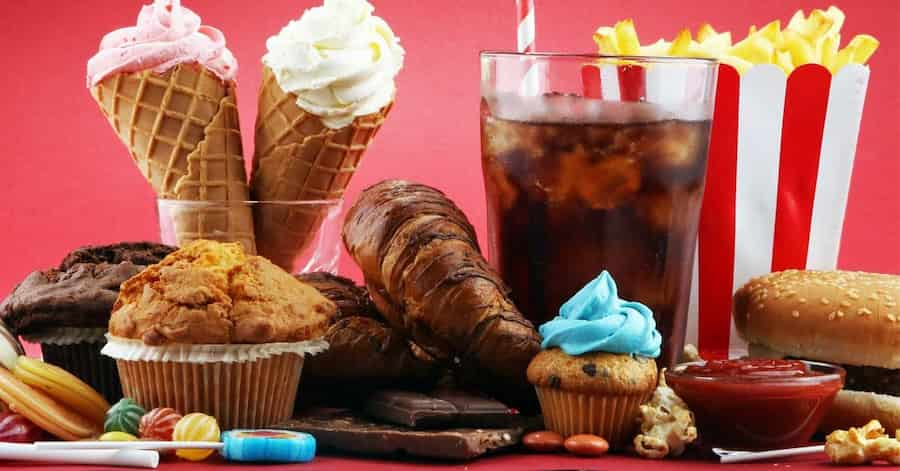
Foods high in sugar can suppress the immune system, impairing your body’s natural ability to heal. Studies have shown that sugar intake can reduce the efficiency of white blood cells, the body’s primary defense against infections. Thus, excessive consumption of sweets, pastries, soda, and other sugary foods might not be the best idea post-piercing.
Alcohol
Alcohol can dry out your skin and cause dehydration, affecting the healing process negatively. It’s a vasodilator, meaning it widens the blood vessels, causing the body to lose more fluids and potentially leading to dehydration. Plus, excessive alcohol consumption can suppress your immune system, and you need to be in top shape to help your body heal. Therefore, it’s best to limit alcohol intake after your piercing.
Caffeine
Caffeine, found in coffee, tea, or energy drinks, can cause dehydration. This could slow down your piercing’s healing. Drinking too much can dry out your skin and delay recovery.
Highly Processed Foods
Highly processed foods often lack the essential nutrients required for optimal healing. They may also increase inflammation, making the healing process more uncomfortable. This category includes fast foods, pre-packaged meals, and processed snacks. They often contain high levels of salt, sugar, and unhealthy fats, which could potentially slow down your body’s healing process.
Red Meat
While red meat can be a good source of protein and iron, which are beneficial for healing, some people may find that it increases inflammation and slows down the healing process. This is especially true for processed and high-fat cuts of red meat. Therefore, it may be beneficial to limit your red meat consumption, especially in the initial healing stage, and focus on lean protein sources instead.
Dairy Products
While dairy products can provide beneficial nutrients like calcium and protein, they can also lead to increased mucus production in some people. This could potentially cause complications with your piercing, especially if the mucus buildup causes you to frequently blow your nose, disturbing the new piercing. Be mindful of your body’s reactions to foods like milk, cheese, and yogurt.
Please note that these guidelines can vary based on individual responses to different food types. Always listen to your body and consult with a healthcare professional if you have any concerns.
High-Fat Foods
Foods high in unhealthy fats, such as fried foods, fast foods, and certain cuts of meat, can increase inflammation in the body, which could potentially slow down the healing process of your piercing. Moreover, these foods can make you feel sluggish and negatively impact your overall health. It’s best to opt for healthier fats, like those found in avocados, nuts, and seeds.
Citrus Fruits
While citrus fruits are excellent sources of vitamin C, which is beneficial for healing, they can sometimes be problematic if you have a fresh piercing. Citrus can potentially increase the acidity of your body, which may cause discomfort, especially if your piercing is still sensitive. Foods like oranges, lemons, limes, grapefruits, and certain juices fall into this category.
Peanuts and Peanut Butter
Peanuts and peanut butter are somewhat controversial in the context of healing piercings. Some people have found that they cause swelling or discomfort around the piercing area. This could be due to the relatively high amount of salt in some peanut butter brands or an individual’s specific reactions to peanuts.
Garlic
Garlic, despite its many health benefits, can act as a blood thinner, which might complicate the healing process of a new piercing by promoting excess bleeding. It’s advisable to limit excessive consumption of garlic immediately after getting a nose piercing until the initial healing process is over.
Beneficial Foods for Improved Healing
Knowing what to avoid is just one piece of the puzzle; it’s also crucial to know what you should consume. Foods rich in vitamins A and C, zinc, and protein can significantly aid the healing process. Opt for leafy greens, lean meats, fruits like bananas and apples, and legumes. Remember to keep well-hydrated by drinking plenty of water, too.
Maintaining a balanced and nutritious diet can support your immune system and promote faster healing. Here’s a brief overview:
Fruits and Vegetables:
Packed with vitamins and antioxidants that can boost immunity and speed up the healing process.
Protein-rich Foods:
Essential for tissue repair and regeneration. Examples include lean meats, eggs, and legumes.
Whole Grains:
Rich in fiber, assisting in reducing inflammation.
Healthy Fats:
Found in foods like avocados, olive oil, and fish, these fats can help combat inflammation.
Hydrating Foods:
Foods high in water content, such as cucumbers and watermelon, can aid in maintaining hydration levels, facilitating healing.
Additional Aftercare Tips for Nose Piercing
Aside from diet, other lifestyle factors contribute to a smooth healing process:
Cleanliness:
Keep the pierced area clean and sanitized. Use a saline solution or any recommended cleaning solution.
Hygiene:
Always wash your hands before touching your piercing.
Sleep:
Good sleep promotes healing and strengthens immunity.
Hydration:
Drink plenty of water to support overall health and healing.
Exercise:
Be cautious with physical activities to avoid injury to the piercing.
When to Consult a Professional
If you experience severe pain, unusual discharge, persistent redness, swelling, or any signs of an allergic reaction or infection, it’s crucial to seek medical attention promptly. Professionals can provide appropriate treatment and advice to prevent complications.
Related:
FAQs
What helps a nose piercing heal the fastest?
To speed up nose piercing healing, maintain good hygiene by cleaning the area with a saline solution, get plenty of sleep, stay hydrated, and follow a balanced diet rich in vitamins, minerals, and proteins. Avoid touching the piercing and any potential irritants like makeup or certain skincare products.
Why can’t you eat eggs after piercing?
The notion that you can’t eat eggs after getting a piercing is a myth. Eggs are a good source of protein that can support the healing process. However, if you have an allergy to eggs, you should avoid them as allergic reactions can complicate healing.
What irritates nose piercings?
Several factors can irritate nose piercings including excessive touching, harsh cleaning products, exposure to makeup and skincare products, and certain types of jewelry materials, such as nickel. Certain foods like those high in sodium can also lead to swelling and discomfort.
What not to use on a nose piercing?
Avoid using alcohol, hydrogen peroxide, or antibiotic ointments on a nose piercing as these can dry out and irritate the skin. Also, steer clear of hard, alcohol-based, or perfumed soaps. Instead, use a saline solution or a gentle, non-alcoholic cleaning solution.
How do you wash your face with a nose piercing?
When washing your face with a nose piercing, be gentle around the piercing area. Use a mild, fragrance-free soap and warm water. Try to avoid getting makeup, skincare products, or soap directly on the piercing.
How long until nose piercing stops hurting?
Generally, the initial pain from a nose piercing subsides within a few days. However, the piercing will remain tender during the healing process, which can take anywhere from 2 months to a year, depending on the individual’s healing rate and how well they care for the piercing. If the pain persists or worsens, it’s important to seek professional help.
Is it okay to drink alcohol a few days after getting a nose piercing?
It’s generally advisable to avoid alcohol for at least a few days to a week after getting a piercing as it can cause dehydration and slow down the healing process.
Can I eat spicy food if it doesn’t cause swelling or discomfort around my piercing?
Individual reactions to food can vary. If spicy foods do not cause any discomfort or inflammation for you, they may not hinder your healing process. However, it’s best to consume in moderation.
Why does the type of jewelry matter for the healing process?
The material of your jewelry can cause different reactions in your body. Hypoallergenic materials like titanium, surgical steel, and gold are typically safer and more comfortable for a new piercing.
Conclusion
Your diet plays an essential role in healing a new nose piercing. By avoiding certain foods and prioritizing others, you can facilitate a smoother and potentially faster healing process. Keep in mind that everybody is unique, so individual reactions may vary. If you have any doubts or concerns, always consult with a professional.

Camila Luna is a passionate jewelry enthusiast and content creator at Miami Jewelry Co. With a focus on providing high-quality, Miami-style jewelry, Camila and her team specialize in a wide range of jewelry that includes bracelets, necklaces, earrings, and more
